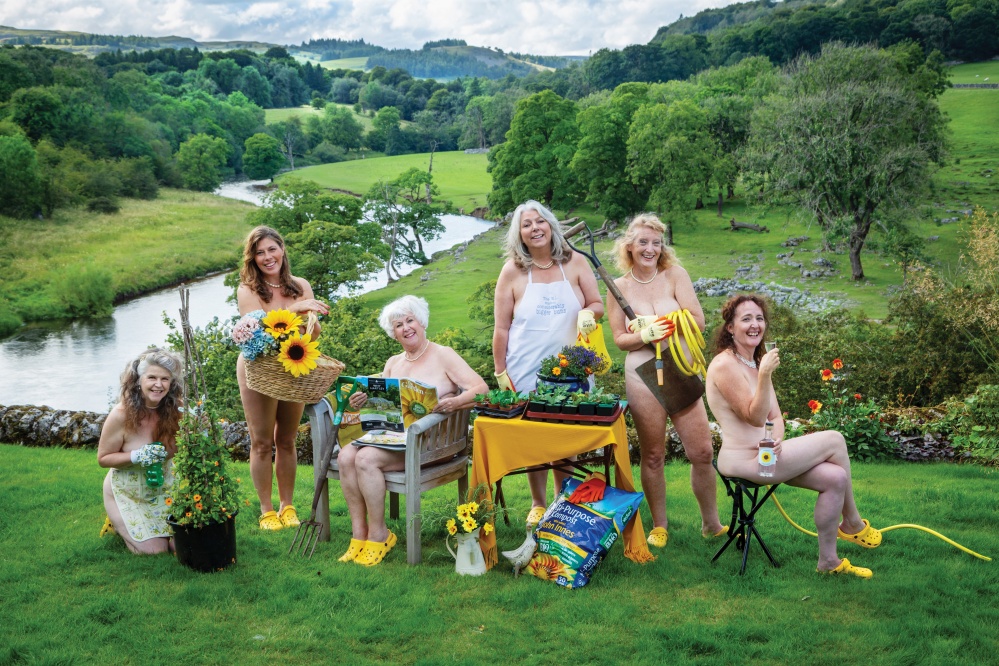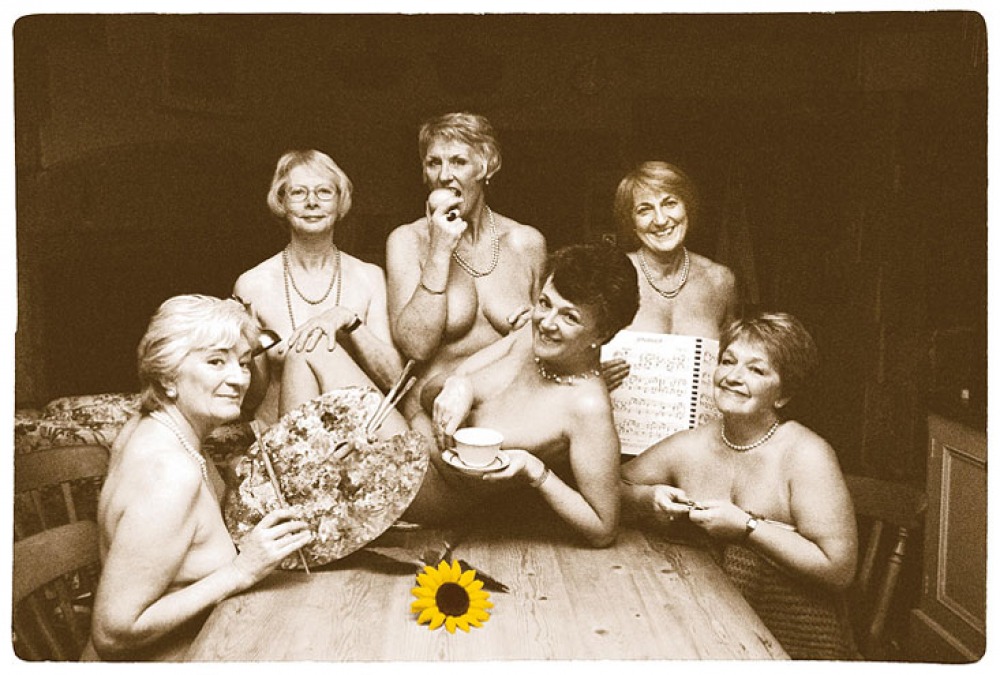Calendar Girls: The Musical comes home to The Dales

After finding global success as a film, a play and a Gary Barlow musical, the Calendar Girls story is returning home to the Yorkshire Dales

The original Calendar Girls have raised almost £6 million for blood cancer research since their calendar was first conceived in 1999 in honour of Yorkshire Dales National Park Officer, John Baker. When Angela Baker lost her husband to non-Hodgkin lymphoma in 1998, her fellow members of the Rylstone & District Women’s Institute rallied round to support her. Her close friend and neighbour Tricia Stewart forged the idea of a charity fundraising calendar with a difference to celebrate John’s love of life. Lynda Logan’s artist and photographer husband, Terry Logan, brought that concept into reality.
Their story is now well known. Photographed at the Logan’s idyllic cottage in Threshfield, each of the middle-aged ladies was photographed naked, but discretely and partially covered by the props of various traditional WI-themed activities, from jammaking to flower arranging.
The sepia shots were notable for a colourful yellow sunflower and witty caption, creating an alternative WI Calendar. The original fundraising target for the cheeky calendar was £5,000, but it actually raised more than £300,000 before the year 2000 was over, as the story hit the national press and captured the hearts of many.
The story doesn’t end there though. In 2003, with backing from Disney, Harbour Pictures released their film Calendar Girls, with a star-studded cast headed by Helen Mirren and Julie Walters. Some of the original girls and several members of Grassington Players appeared as extras in the film.
The interest generated by the calendar and associated fundraising activities saw six of the original Calendar Girls becoming stars in their own right. Always smartly attired in black and displaying their distinctive sunflower emblem, they tirelessly attended functions far and wide to support the charity.
In 2009 the stage play was released in the West End, with another spin on the story thanks to script writer, Tim Firth. Then, to mark the 10th anniversary of the original, Terry and the girls produced a new calendar in 2010, featuring the remaining original calendar girls a decade on.

In 2012, Grassington Players staged the amateur world premiere of the play to much acclaim. It then went on to be performed more than any other play by amateur dramatic societies across the world, with more than 500 productions raising funds for the charity.
Eventually, thinking it was all over, the charity staged a glamorous tribute event at the Albert Hall to thank the original Calendar Girls as they officially retired from the fundraising work that had dominated their lives for more than 12 years. But when Tim Firth caught up with his old school friend, Gary Barlow, of Take That fame, suddenly it was very far from all over.
Bringing the story to life, Gary and Tim brought their cast and stage set to Burnsall Village Hall in March 2015 to perform a pilot version of a new musical to an invited audience. Afterwards, the guests (including the original girls and several Grassington Players) were asked to provide feedback on their favourite songs to help shape the final show. The Girls opened at Leeds Grand Theatre in 2015, went on to the West End in 2017 and was then adapted for touring the provinces as Calendar Girls: The Musical. Now, with the first license issued for amateur performing rights going again to Grassington Players, the Calendar Girls story comes of age 21 years on from the 2000 calendar.
Grassington Players’ links to the original girls go back a lot further than that though. Beryl Bamforth, the real Miss January, joined the amateur dramatic society in 1970, and she is now its longest serving member. John and Angela Baker were former members and Beryl fondly recalls directing Angela in There Goes the Bride. You could say the stage was set for their future exploits.
Beryl was 65 and the oldest of the original girls when the 2000 calendar was made. The character, Jessie, in the fictional adaption, will be played in the forthcoming musical by Jennifer Scott, aged 77. She also played the character nine years ago in the Grassington Players production of the play.
Alongside her, Beryl’s son Mark Bamforth plays Rod and his partner Jane Ellison-Bates is reprising her role of Annie, the fictional character representing Angela Baker. ‘It feels like it’s the family business,’ Jane laughs. ‘Right from the start, for me, it’s been about honouring the real girls and what they did.’ Jane admits that it feels like this musical may be wrapping the story up as it returns home. ‘But it’s too good to let go,’ she adds. ‘Like with the play, I think a lot of people will embrace the musical. It just shows that the story still has legs.
‘It’s your typical feel-good story where there are things that so many people can relate to within it. The original girls in it were the first to really highlight the issues around body image. Mainstream television programmes later took off celebrating nudity (and not being self-conscious) but Calendar Girls really The original Calendar Girls with some of the Grassington Players. Heidi Marfitt Photography goes back to the root of that. It’s something which people still find refreshing today. Even if people themselves don’t feel that they could ever be that confident, they can admire those that can – and aspire to be like that. It’s an uplifting show and it appeals to people on so many different levels. Emotionally, it’s like a rollercoaster. One minute there’ll be a scene that’s really poignant and will have you choked up and the next minute there’ll be a funny scene to lift you up again.’
Of course, Covid-19 saw the Grassington production face plenty of challenges along the way. Originally rehearsals were underway for the opening performance in May 2020. With the show rescheduled for this September, rehearsals were eventually able to restart in July, with a few cast and crew adjustments. ‘At times, it felt like you’re going one step forward then two steps back. Last night, we rehearsed from 7pm until 10pm and that’s after a day’s work,’ Jane continues. ‘It’s a big ask for many and it’s taking over our lives at the moment but it’s the same for all of our volunteers too – hopefully it’ll all be alright on the night. We’ve bagged the first date, but the license is out there now so if we have to delay again, we might not be the first to perform and that’s really important to the Grassington Players. I just hope we can do the original show justice and be a great tribute to the original girls.’
Beryl is confident that Grassington Players will do the musical justice, as they did the play. ‘Many amateur drama groups don’t necessarily have singers and probably wouldn’t tackle this difficult show, but we are very fortunate that we do have singing talent in the company,’ she says.
There is added poignancy and irony in that cancer has impacted on the Players’ production. Cast member Paula Vickers, originally reprising a leading role, had to drop out of rehearsals early last year to undergo treatment for throat cancer. Happily, 18 months on, she has recovered and is taking on the role of another of the girls for this year’s revised show dates. Tragically, however, the original set designer Andrew Jackson passed in March, after battling lung cancer. He had also been John Baker’s doctor. Then, during rehearsals, cast member Lottie Cuerden (playing Jenny) lost her mother, Bev Cuerden, another Grassington Player who had fought the disease for four years.
The cancer charity linked with Calendar Girls has gone through almost as many iterations as the story itself. Leukaemia Research became Bloodwise and has recently evolved into Blood Cancer UK. All ticket sale profits from the Gala opening night will go to them, along with a percentage from the other performances, and £1 on every bottle of the associated Liquid Yorkshire Gin sold. The show is being generously sponsored by local broadband supplier Boundless Networks.







